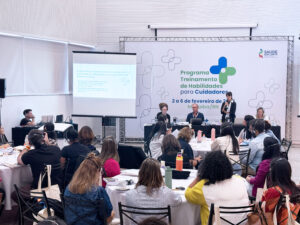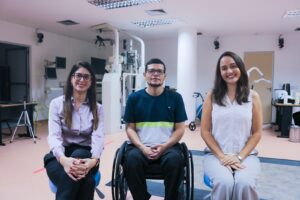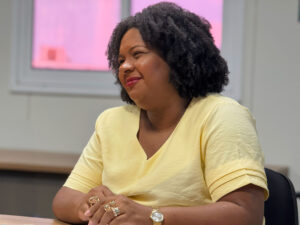The identification of dyscalculia came belatedly for Larissa Pessoa, a psychologist and resident at the Multiprofessional Residency in Health Care for Persons with Disabilities (RESPCD) at the Santos Dumont Institute (ISD). Diagnosed at age 16, Larissa reflects on her difficulties during the period when she did not know about the existence of the disorder. At school, for example, she was good at literature, history, geography and science – anything that, according to her, involved as little math as possible – but she was constantly subjected to the feeling that she didn't try hard enough and had her difficulties interpreted as a lack of commitment.
On March 3, the International Day of Dyscalculia takes place, a specific learning disorder characterized mainly by a persistent difficulty in numerical processing, basic calculations and logical reasoning.
“I tried at all costs to be good at calculus and mathematics and I couldn't. Only after the diagnosis did I understand that it was a two-way street and that it wasn't just me who had to build this. From then on, together with the psychologist, I started the process of sensitizing my parents to seek follow-up, neuropsychological assessment, which was a very difficult process, but it worked”, says the resident.
Larissa reinforces that the difficulties, at the time of the diagnosis, were not limited to the classroom, but were mixed with all day-to-day activities. For example, there were times when he got hurt because he had no concept of space, or when he got lost because he didn't have a sense of the sequence of the places he was going through.
Currently, the resident points out that she experiences much less difficulty in these aspects, and that the diagnosis and subsequent implementation of strategies allow access to various spaces and facilitate her adaptation in society.
“The diagnosis changed my life, because I had access to the knowledge of realizing that I am different and that this does not make me smaller: it makes me full of potential and some weaknesses too, like everyone else. I won a fight, but I also won friends, colleagues and companions in the fight for inclusion”, points out Larissa.
Nowadays, Larissa works in the social networks in a profile intended to be a “logbook”, narrating the experience of a person with dyscalculia, seeking to inform, share difficulties, strategies and achievements.
Diagnosis and follow-up are key
Dyscalculia is classified in the category of specific learning disorder because it is not just a difficulty in mathematics, but something persistent, that is, that accompanies the person diagnosed throughout life. The neuropsychologist preceptor Caroline Leôncio, from ISD, explains how dyscalculia is identified and what attitudes and strategies can be worked on in the routine of the person diagnosed with the disorder.
The signs of dyscalculia can be noticed from an early age, with the school being the main place of evidence that this disorder can appear, as it more often requires mathematical knowledge from children and adolescents. However, this perception does not necessarily facilitate a diagnosis.
“Dyscalculia is still very little known among other learning disorders. Furthermore, there is a cultural factor involving mathematics in schools, which is that of seeing it as a 'villain', so children end up withdrawing naturally from this topic”, explains the professional.
Like other neurodevelopmental disorders, dyscalculia has no biological markers, and the diagnosis is essentially clinical, driven by behavioral and exclusion criteria. For example, it is necessary to rule out the possibility that the difficulty with mathematics is related to the educational method, a lack of assistance or the presence of intellectual or sensory impairments in the child.
multidisciplinary intervention
According to the neuropsychologist Caroline Leôncio, there is no cure for dyscalculia, but the neuropsychological evaluation added to the multidisciplinary evaluation with a pedagogue, are fundamental in improving the quality of life and social inclusion of people diagnosed with the disorder.
Some of the examples of curricular strategies and adaptations that can be adopted, in a joint effort with the school team, are the insertion of texts and other non-numerical resources, whenever possible, adjustments in the presentation of graphs and numbers, and the insertion of materials visuals, among many possibilities.
The neuropsychologist emphasizes that training education professionals and people around them to deal with neurodevelopmental disorders and, based on early signs, being able to identify them and provide appropriate referral is one of the steps to achieve greater visibility of the disorder.
The treatment, according to Caroline, varies from person to person, since each one has different strengths and needs. “An individualized intervention plan is important, which considers the cognitive potential, interests and needs of each person, in addition to cultural, social and emotional factors. It is necessary to understand the points of strength in the neuropsychological functioning of each subject, in order to be able to propose strategies that compensate and minimize the difficulties”, concludes the professional.
Text: Naomi Lamarck / Ascom – ISD
Photograph: Naomi Lamarck / Ascom – ISD
Communication Office
comunicacao@isd.org.br
(84) 99416-1880
Santos Dumont Institute (ISD)
It is a Social Organization linked to the Ministry of Education (MEC) and includes the Edmond and Lily Safra International Institute of Neurosciences and the Anita Garibaldi Health Education and Research Center, both in Macaíba. ISD's mission is to promote education for life, forming citizens through integrated teaching, research and extension actions, in addition to contributing to a fairer and more humane transformation of Brazilian social reality.













